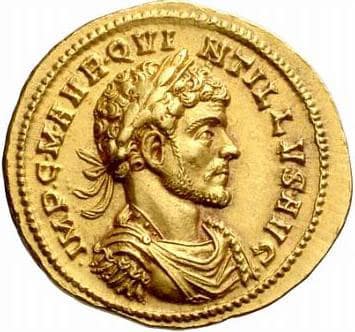Life: AD ? – 270

- Name: Marcus Aurelius Quintillus
- Became emperor in August AD 270.
- Died at Aquileia, ca. September AD 270.
Marcus Aurelius Quintillus was the younger brother of Claudius II Gothicus.
He had been left in command of troops in northern Italy, while Claudius II was on campaign against the Goths in the Balkans, to prevent any invasion across the Alps by the Alemanni.
And so at the emperor’s death he was based in Aquileia. No sooner was the news of his brother’s death received, then his troops hailed him emperor. Shortly after the senate confirmed him in this position.
Both the army and the senate appeared reluctant to appoint the more obvious candidate Aurelian, who was understood to be a strict disciplinarian.
There are conflicting views as to whom Claudius II had intended as his successor. On one hand it is suggested that Aurelian, over whom Claudius II had been chosen, was the emperor’s rightful heir. On the other hand it is said that the late emperor had declared that Quintillus, who, unlike himself, had two sons, should be his successor.
Quintillus’ first act of state was to request the senate to deify his late brother. A request which was granted at once by a sincerely mourning assembly.
But in a fatal error, Quintillus remained for some time at Aquileia, not moving immediately to the capital to consolidate his power and gain vital support among the senators and the people.
Before he had chance to make any further mark on the empire, the Goths caused trouble again in the Balkans, laying siege to cities. Aurelian, the fearsome commander on the Lower Danube intervened decisively. At his return to his base at Sirmium his armies alas hailed him emperor. Aurelian, if truthfully or not is unknown, made claim that Claudius II Gothicus had meant him to be the next emperor.
Quintillus’ desperate attempt to contest Aurelian’s claim to the throne lasted only a few days. By the end he was completely abandoned by his soldiers and committed suicide by slitting his wrists (September AD 270).
The exact length of the hapless Quintillus’ reign is unknown. Although varying accounts suggest that it lasted between two or three months and only 17 days.

Historian Franco Cavazzi dedicated hundreds of hours of his life to creating this website, roman-empire.net as a trove of educational material on this fascinating period of history. His work has been cited in a number of textbooks on the Roman Empire and mentioned on numerous publications such as the New York Times, PBS, The Guardian, and many more.
